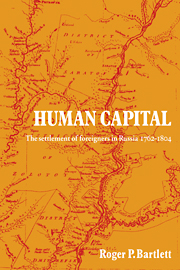Book contents
- Frontmatter
- Contents
- Weights and measures
- Abbreviations
- Preface
- Introduction
- I Antecedents
- 2 Catherine II and the Manifestos of 1762 and 1763
- 3 The response: settlement 1763–1775
- 4 Southern Russia 1764—1796
- 5 Urban and entrepreneurial settlement under the 1763 Manifesto
- 6 Immigration and colonies 1797–1804
- Conclusion
- Appendices
- Notes
- Bibliography
- Index
5 - Urban and entrepreneurial settlement under the 1763 Manifesto
Published online by Cambridge University Press: 05 May 2010
- Frontmatter
- Contents
- Weights and measures
- Abbreviations
- Preface
- Introduction
- I Antecedents
- 2 Catherine II and the Manifestos of 1762 and 1763
- 3 The response: settlement 1763–1775
- 4 Southern Russia 1764—1796
- 5 Urban and entrepreneurial settlement under the 1763 Manifesto
- 6 Immigration and colonies 1797–1804
- Conclusion
- Appendices
- Notes
- Bibliography
- Index
Summary
Context and policy
According to the Manifesto of 1763, foreigners settling in towns were free to choose their own occupations, and received certain exemptions and concessions; but they were offered no exclusive rights which would set them apart socially from their fellow–townsmen. The majority, as was natural in a group consisting predominantly of artisans, appear to have become members of the craft guilds. The entrepreneurs, however, were usually placed directly under the Chancellery of Guardianship, instead of being subject to the College of Manufactures (Manufaktur–Kollegiya) and its Office (Manufaktur–Kontora).
Throughout most of the eighteenth century the College, in accordance with the rights and duties set out in its founding Statute (Manufaktur–Reglament), exercised control over all Russian manufacturing industry. Only heavy industry – mining and metallurgy – was controlled by the College of Mines (Berg–Kollegiya). Officially, all other enterprises set up in Russia had to receive the consent of the College of Manufactures and accept its supervision. Such licensed (ukaznyye) enterprises and entrepreneurs enjoyed considerable privileges and exemptions; and the College was always on the lookout for unlicensed operators, whom it pursued with great vigour, but little success. This situation lasted until 1775, when Catherine finally abolished all restrictions on manufacturing enterprise. The abolition of the system led directly to the abolition of the College itself in 1779.
- Type
- Chapter
- Information
- Human CapitalThe Settlement of Foreigners in Russia 1762–1804, pp. 143 - 179Publisher: Cambridge University PressPrint publication year: 1979



